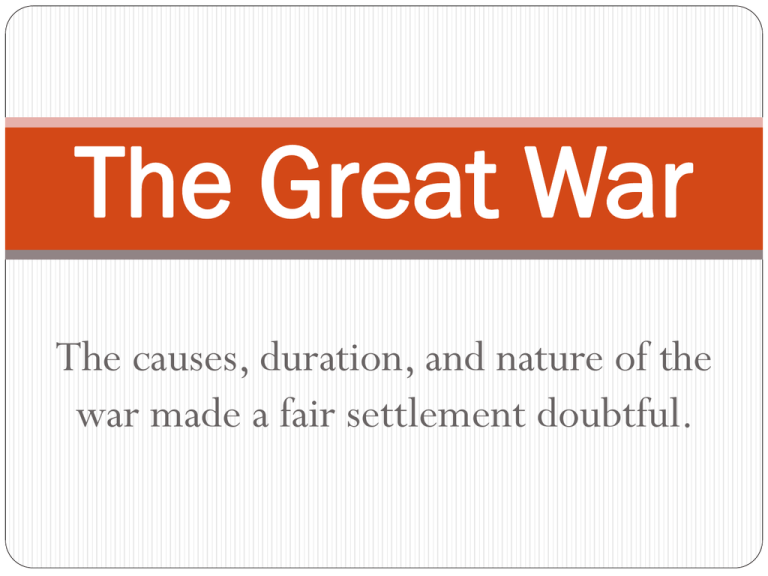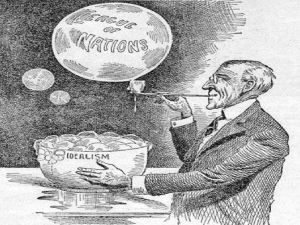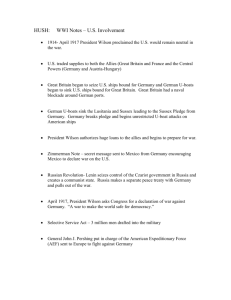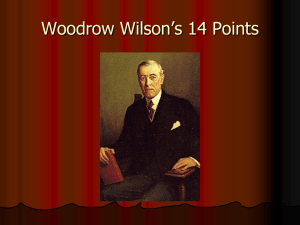Great War
advertisement

The Great War The causes, duration, and nature of the war made a fair settlement doubtful. The Evidence Central Powers Triple Alliance Dual Alliance Entente Cordiale Triple Entente Moroccan Crisis of 1905 Moroccan Crisis of 1911 Balkan Crises 1912-13 Archduke Franz Ferdinand The Black Hand blank check Schlieffen Plan David Lloyd George Georges Clemenceau Woodrow Wilson T. E. Lawrence Winston Churchill Helmuth von Moltke Paul von Hindenburg Vittorio Orlando Ferdinand Foch John Pershing Battle of the Marne Battle of Verdun Battle of the Somme Gallipoli Campaign Lusitania Zimmerman Telegram Competition over colonial claims were the root cause of World War I and directly affected the settlement. The Moroccan crisis of 1905 spurred hostilities between Germany and France Another source of tension was competition between Austria - Hungary and Russia over Ottoman territories in the Balkans France & Britain coveted Ottoman Arab lands. Both were interested in trade in the eastern Mediterranean as well as in oil. During the negotiations at Versailles, Britain and France made sure that they took the territories they wanted, in spite of promises during the war and the principal of self-determination. Britain took East and West Africa and France got Cameroon from Germany They also divided the former Ottoman Arab areas, with France getting Syria and Lebanon and Britain getting Palestine, Iraq, and Jordan. At the conference, Britain and France created the mandate system where their rule over colonies was officially authorized by the League of Nations and theoretically temporary. The politics of blame made it hard to arrive at fair and just settlement. Germany’s 1939 invasion of neutral Belgium as well as its support of Austria-Hungary in its conflict with Serbia, was sufficient reason for Britain and France to assign to Germany the blame for starting the war. Once that responsibility was assigned, it was logical and just that Germany had to pay for the cost of the war. Therefore, war reparations were put into the treaty. This was an important issue particular for Britain, as the length of the war had meant skyrocketing financial costs. Lloyd George had won the election in 1916 with the promise that Germany would pay for the war. The terrible loss of human lives had direct impact on peace negotiations. France felt vulnerable to Germany because of its smaller population. Since most of the war on the western from was fought in France and Belgium, France came to the negotiations wanting revenge and a permanently weakened Germany as well as a buffer state between it and Germany. Wilson and Lloyd George were able to reduce these demands smaller Germany with a small army, a few battleships, and no air force; A demilitarized Rhineland Return of Alsace-Lorraine to France A buffer state between Germany and Russia was made with the recreation of Poland Wilson’s 14 Points further complicated the treaty negotiations Wilson had articulated the need for an international body to prevent future wars in his 14 Points. In order to get the agreement of France and Britain for the League of Nations, Wilson did not insist on the application of some of his other points, particularly selfdetermination. Wilson failed to get his own nation to join the his League of Nations. The nature of the war made a fairly negotiated peace nearly impossible. The length of the war, nearly 4 years, and its nature as a total war involving civilians had meant that each nation launched propaganda campaigns to keep civilian spirits up and committed to the war. Over time, such propaganda, combined with censorship of the press, meant that hatred between the belligerents grew to such a degree that only a harsh peace would suffice to satisfy the hostile emotions of the populace. Therefore, the relatively equitable way that France was treated after the Napoleonic wars was not possible in 1918; Germany was not invited to the peace conference Nor was consideration given to the fact that Germany had changed its government to a republic





